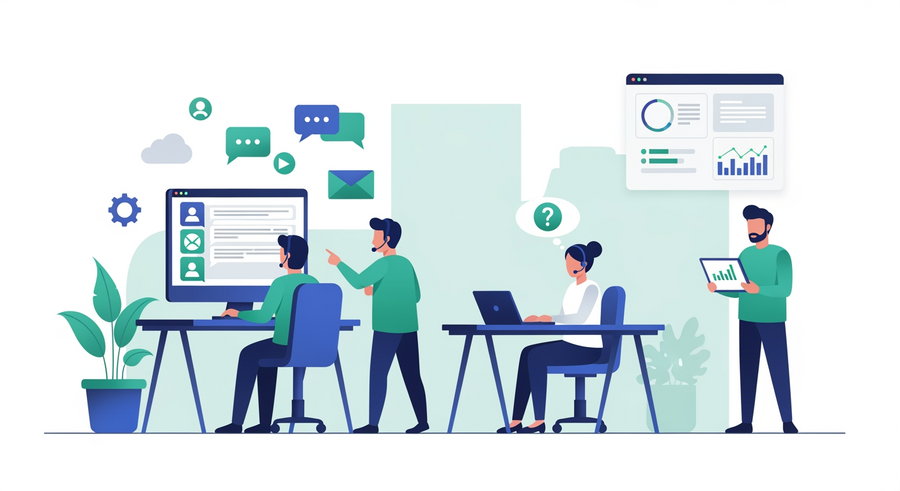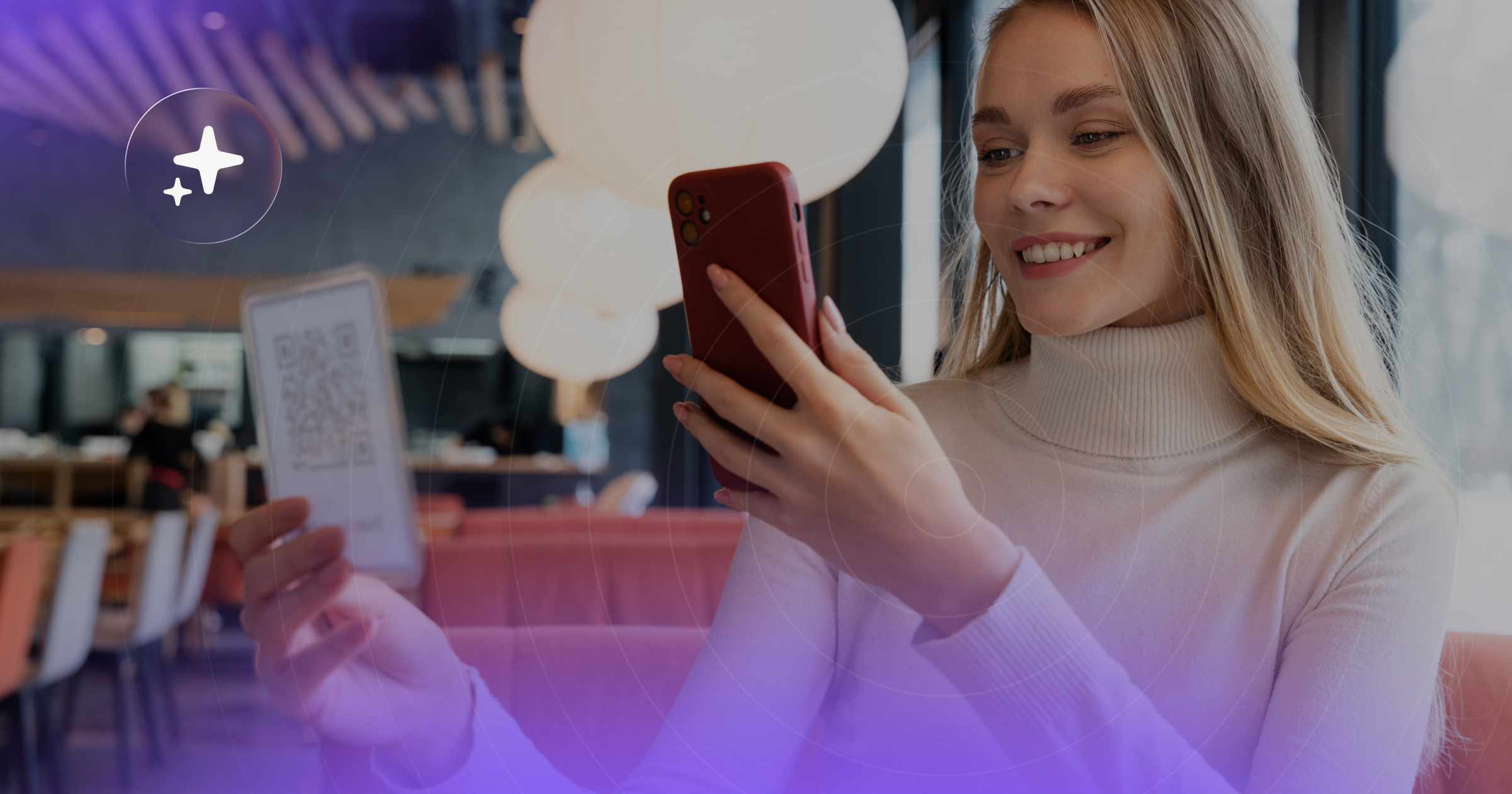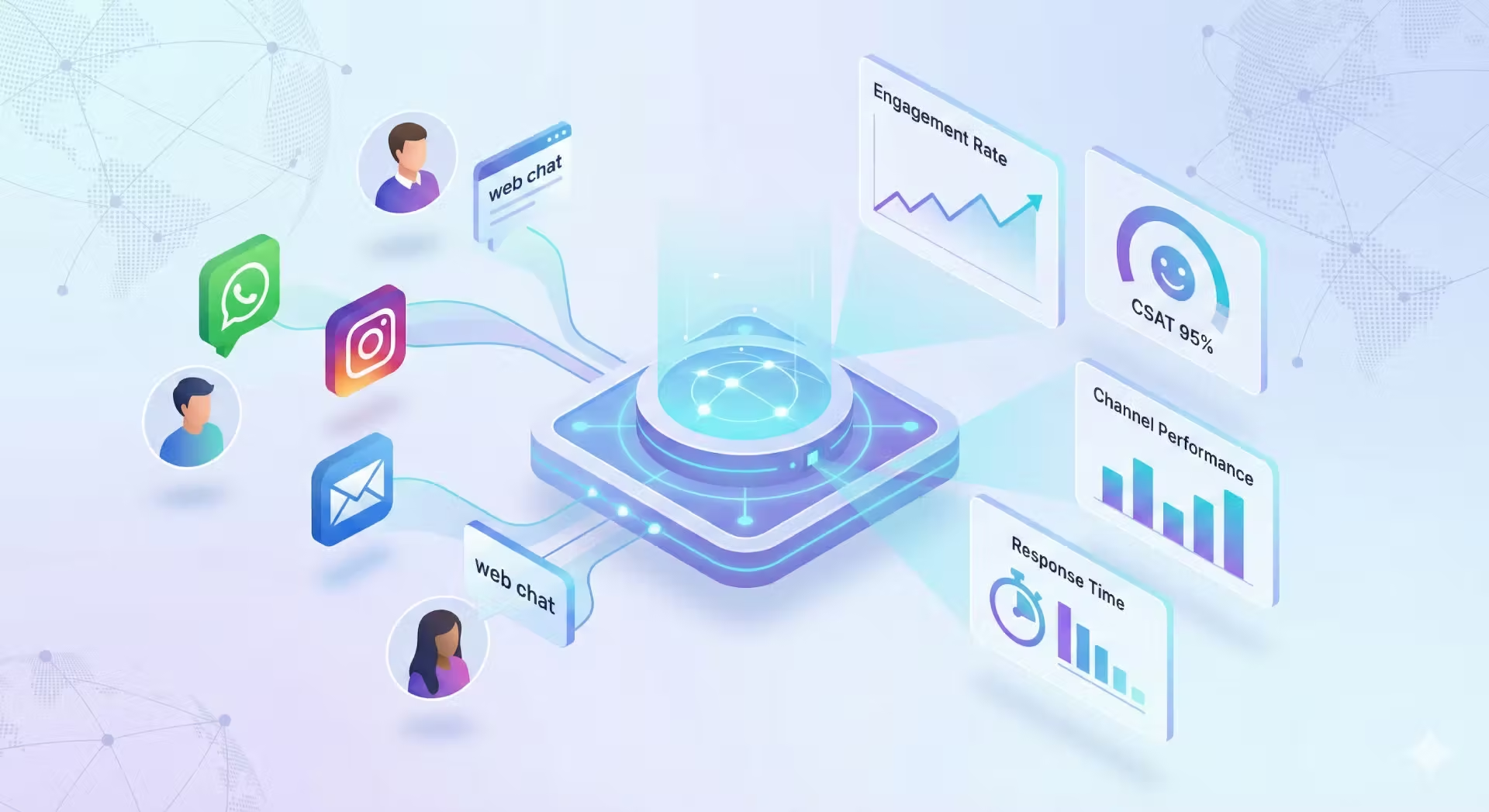It's no secret that people love spending time on WhatsApp. Almost a third of the world's population uses WhatsApp to send messages. On average, users open WhatsApp around 23 to 25 times a day. WhatsApp’s popularity and high engagement rate make it an excellent platform for marketers to engage with customers.
WhatsApp marketing is a new form of marketing where brands promote or sell products and build relationships with customers through WhatsApp. WhatsApp marketing messages draw people and businesses into a two-way dialogue, creating a more personalised brand experience along the customer journey. This direct, personalised customer experience can lead to higher engagement and conversion rates, ultimately driving business growth.
Let's explore how WhatsApp marketing can be a useful tool for your marketing strategy.
Why should you choose WhatsApp Marketing for your business?
According to a survey by Meta, 75% of adults want to communicate with brands in the same way they communicate with friends and family.
As you can see, the ways people choose to engage with businesses are evolving. People now prefer messaging businesses instead of calling or emailing them. That's why it's essential for marketers to select the right channel to communicate with customers. Marketing via legacy channels such as email can be effective, but it can also be overwhelming as consumers receive too many promotional emails in their inboxes every day. They mostly end up unread or sent to spam. 55% of consumers said that they ignore marketing emails because they receive too many.
Compared to emails, WhatsApp messages are more effective with higher open rates and engagement. WhatsApp messages have an open rate of around 98% and a click rate of around 45-60%. Email is nowhere close to that with an average opening rate of 21%. What’s more, 80% of WhatsApp messages are read within 5 minutes. This makes WhatsApp a useful platform for marketers to engage with customers.

The difference between the WhatsApp Business app and API
In order to start marketing via WhatsApp, you can either decide to use the regular WhatsApp Business app, or the WhatsApp Business API. But what is the difference between the WhatsApp Business app and WhatsApp Business API? Do the API offer the same features?
The WhatsApp Business app was built for small businesses. It’s a great tool for small teams with limited customer interactions per day. However, for larger teams (consisting of more than four people), the app is too limited. It lacks the collaboration features, automation options, and analytics that you need in order to offer the right experience for your customers and work efficiently.
The WhatsApp Business API, on the other hand, is designed for larger businesses to manage WhatsApp Business conversations. It enables teams to work together on answering messages, automate repetitive workflows, and learn from in-depth insights into team performance and customer happiness. With the API, you can send a bulk message to up to at least 1000 recipients per day. You can reach customers who don’t have you saved as a contact.
How to send a WhatsApp Broadcast message
A WhatsApp broadcast message is a message that is sent from a single WhatsApp account to multiple phone numbers at the same time. Although it looks like you’re communicating in a group, the recipient can’t see that the message is broadcasted. They will receive the message as a private message. WhatsApp broadcast first was a consumer-only feature, but it’s now also available for businesses.
This opens up a special opportunity for businesses that use the WhatsApp Business API. Earlier, those businesses could only respond to inbound messages. With broadcast messaging, they can now also send outbound messages.
With the WhatsApp broadcasting feature you can:
- Create a group of customers
- Add a call to action to your messages
- Broadcast to big groups of customers in one go

As WhatsApp Business keeps on adding new features, it becomes an increasingly effective outbound marketing tool. Marketers can send newsletters, promotional messages, event invitations and more via WhatsApp. However, in order to send a broadcast message via the API, you’ll need to use template messages. But what exactly is a template message? Let’s dive in.
How to create WhatsApp marketing template messages
WhatsApp allows businesses to interact with their users with any message until 24 hours from the user’s last message. Once this window is closed, you can only send a pre-approved template message. That’s because WhatsApp doesn’t want its users to deal with constant spam. WhatsApp checks if the messages abide by their commerce policy.
In order to send WhatsApp marketing messages, you’ll need to get an opt-in from your customers. This means you can’t just spam a random list of contacts. Once your customers have opted in, you can start creating templates for your messages.
Before sending any messages, ask yourself if they are timely and relevant to the recipients. Personalising your messages can help build trust and confidence with your customers, encouraging them to come back. You can personalise your WhatsApp marketing templates with placeholders such as [company name], [customer name], [order number], and [date].
WhatsApp Marketing use cases
WhatsApp marketing messages can be anything ranging from a promotional message, shipping update, weekly newsletter, abandoned cart update, event invitation, and more.
To give you a better idea of how you can use WhatsApp marketing messages, here are some examples:
Newsletters
According to a survey by Gartner, 73% of customers appreciate it when companies proactively provide educational content about their products and services. But let's be honest - we all receive way too many newsletters in our email inboxes every day, making us feel overwhelmed.
Why not send your newsletters via WhatsApp instead? You can use WhatsApp newsletters to share relevant and valuable information with potential customers who are still learning about your brand.
See how we send Trengo updates in our monthly newsletter.

There are so many creative ways to engage your customers through WhatsApp newsletters.
Let’s assume you’re a clothing company. You can send your customers personalised messages with seasonal fashion tips or outfit ideas based on their past purchases.
If you’re a media & entertainment company, you can send top news headlines to your customers.
Here is an example:
1. “Here are the top stories from [brand name] this week:
[link]
[link]
[link]
You’re receiving this message because you opted into WhatsApp newsletter from [brand name]. You can opt out by replying “Stop” at any time.”
💡Tip: Give your customers the option to opt out of messages at any time when you’re the one starting conversations. This way, you’ll show your customers that you respect them and their time.
Promotional messages
WhatsApp promotional messages are an excellent way to stay in touch with your customers, show them that you value them with special discounts, and keep your business top-of-mind instead of your competitors.
For example, you can keep your customers engaged with personalised coupons throughout the year, whether they’ve recently made a purchase or not.
Here are some promotional messages you can use:
2. “Hey [name]! 🔥New promotion alert🔥 This week, you can get a 30% discount on orders above [amount]. Use the promo code DISCOUNT30. Order now at [link]”
3. “This month for members only! We like to treat our loyal members with a 20% extra discount on all premium products. Visit [link]”

Order notifications and shipping updates
Thanks to the WhatsApp Business API, shipping updates and order confirmations are even more accessible. Instead of only sending these updates via email, you can now also automatically send them via WhatsApp. Sending timely, relevant, and personalised notifications will help you build a trusting relationship with your customers.
As you can see in the example below, you can also give them the chance to track their orders via WhatsApp.
4. “Hi [customer name],
Thank you for your order at [business name] 😊
Your order with order number [###] will soon be on it's way.
We will keep you updated!
Cheers, [Fulfilment manager]”

💡Tip:
You can schedule notifications or trigger them based on certain events. For example, you can choose to send an automated notification to a customer as soon as their purchase is made. To enable this functionality, you need to integrate your webshop software with the API.
When you use the API via Trengo, you can use native integrations with Shopify, WooCommerce, Magento, and Lightspeed.
Upsell and cross-sell messages
Investing in existing customers is always a smart move. According to a HubSpot survey, 72% of salespeople who upsell and 74% who cross-sell say it drives up to 30% of their revenue. So why not take advantage of WhatsApp to do that?
To upsell and cross-sell products, you can use targeted WhatsApp messages based on your customers' behaviour.
Here are some examples:
5. “Hey [customer name],
Your wine glasses have been shipped and are on their way! We’ll update you with a tracking code within the next 24 hours!
Is your table setting complete, or would you like to add [link candle holders] to make your romantic dinner even more special?
Explore our entire collection at [link].”
6. “Dear [customer name],
We’re excited to have you as our guest from [date] to [date].
If you’d like any additional amenities or services, we’d be happy to provide those for you during your stay.
Our hotel offers: [list of amenities such as spa, massage, fitness]
Here you can upgrade your experience: [link]
Thank you for choosing us and we look forward to seeing you soon.”
Abandoned cart updates
It's tough to hear, but the data shows that around 81% of all online shopping carts are abandoned. With WhatsApp, you can send personalised, automated messages to customers who have abandoned their cart.
Automated cart reminders are a simple and effective way to re-engage customers and encourage a purchase.
Check out some abandoned cart update messages:
7. “Hi [customer name]! Wait! We noticed that you left your shopping cart full of cool stuff. 😎 But before placing your order, you might also want to consider adding these [link items] to your cart. Thank you for shopping with us!”
As you can see in the example below, you can also create FOMO with including “this item is going out of stock” to your message.
8. “Hey [customer name]. You left your hoodie in your shopping cart. 🛒 We wanted to let you know that your selected colour is going out of stock. Hurry before your favourite piece is gone for good.🏃🏻♀️🏃🏽♂️Return to your cart:[link] ”
Sending an abandoned cart reminder with a coupon or offer can make their decision to purchase even more effective:
9. "Hi [customer name], we’ve got some good news for you. The item in your cart is now 10% off. But hurry, this offer is only valid for the next 24 hours. Claim your discount now: [link]”
Event invitations
Event organisers can quickly send out event updates, answer customer queries, and provide event information in real time via WhatsApp.
Sending event invitations via WhatsApp will help you increase engagement and provide more personalised communication with your guests.
Here's an example of a webinar invitation that you can send via WhatsApp:
10. "Hey [customer name]! It’s been a while. We have some exciting news!
We’re hosting a live webinar about how to improve engagement through WhatsApp marketing templates.
At the end of the webinar, you’ll get a free excel sheet with 100 message templates.
Don’t miss out! Register here:[link]”
📚 Read more: Do you want to see more WhatsApp marketing templates? Check out 15 WhatsApp Marketing Message Samples to Boost Sales.
WhatsApp marketing automation
With the WhatsApp Business API, you can also automate many of your marketing efforts. Here are the things you can do via Trengo:
1. Set up chatbots and flowbots
When you send WhatsApp marketing messages, it's important to be available for follow-up if needed. This can be accomplished easily with WhatsApp Business chatbots.
A WhatsApp Business chatbot is a technology that simulates a conversation with customers via WhatsApp. By analysing past interactions with customers, chatbots can retrieve key information such as preferences, order history, and previous questions. With this information, marketers can create highly personalised and automated messages to boost engagement.

You can train the bot by providing answers to frequently asked questions. The more variations you provide, the smarter it becomes.
When building a chatbot for WhatsApp in Trengo, you can choose to build either a regular chatbot or a flowbot. The flowbot also simulates conversations with customers. Instead of answering open questions, it forwards customers to the right team or provides information by asking questions with multiple-choice options.

A great example of how chatbots helped streamline a business’s customer service is BAS World’s flowbot. BAS World received a lot of queries from customers on live chat as well as WhatsApp. In addition to that, customers spoke different languages so catering to them was an added challenge.
BAS World took on this challenge and implemented a multilingual flowbot. Not only could they efficiently respond to customers’ questions in different languages but the flowbot also gave out information, quotations, and even let customers make appointments.
📚 Read more: BAS World's flowbot collects leads in no less than thirteen languages
2. Use quick replies
After sending out a marketing message via WhatsApp, chances are you’ll get many replies. Handling these replies can be time-consuming and overwhelming for you, especially if you are manually responding to each message. Fortunately, you can speed up this process with quick replies.
A WhatsApp Business quick reply is a templated message that you can easily search, edit, and send to your customer. They are often used by customer service agents to answer frequently asked questions.
Many customers have similar questions, such as product prices, payment methods, return policies and expected delivery times. Instead of manually answering these repetitive questions, you can use quick replies to handle them. They save your team a lot of time and reduce duplication of efforts. Plus, they make it easier to keep a steady tone of voice as a team.
📚 Read more: 15 life-saving quick reply messages for WhatsApp Business
3. Set up rules
Rules in Trengo allow you to automate repetitive parts of your team’s workflow. Tasks like assigning messages to the right agent, adding certain labels to conversations, sending out CSAT surveys and more. Rules are automated conditions that trigger specific actions, and once created, they execute automatically.
In the example below, you can see that flowbot asks the customer what they’re looking for. When they choose the option “explore destinations”, you can label the conversation as a lead via rules.

Here is another example. Let’s assume you want to send an appointment confirmation to your customer. You can create buttons and give your customers options to confirm, reschedule or cancel the appointment. To do this, you can trigger an auto-reply via rules in Trengo.

In order to make the most of these automation features you first need to implement the WhatsApp Business API. The API doesn’t come with an interface, which is why you’ll need a WhatsApp Business Solution Provider such as Trengo.
Start Trengo’s free trial and get started with automating your business via WhatsApp Business API right away.
WhatsApp Marketing campaign examples
Here are some successful WhatsApp marketing campaign examples that can inspire you.
Hellmann’s

Campaign: WhatsCook
Hellmann's WhatsApp marketing campaign connected people with chefs who taught them how to cook using mayonnaise in different ways.
Customers received a message from an actual chef who requested pictures of the ingredients in their fridge. The chef then suggested a recipe using those ingredients.
Hellmann's stood out from the competition by using WhatsApp to offer cooking tips and recipes. They created personalised content and provided real-time guidance for each audience member.
KLM
Campaign: Flight Alerts
KLM’s Flight Alerts is another example of a successful WhatsApp marketing campaign. This campaign aimed to inform the family members of passengers about their flight. KLM created a more personalised customer experience by sending flight information through WhatsApp, fostering a deeper connection with their customers.
📚 Read more: 5 Inspiring WhatsApp Marketing Campaign Examples
Start with WhatsApp marketing
WhatsApp marketing presents a great opportunity for businesses, but many have not yet taken advantage of it. Promotional messages have only been available since late 2021, so they are still pretty new. By being an early adopter and using WhatsApp marketing to communicate with customers, businesses can differentiate themselves from competitors.
With the WhatsApp Business API, you can automate your communication, broadcast to your target audience, and achieve great results due to the app's large user base and high open rate.
Whether you’re a small business or a large corporation, adding WhatsApp Business to your marketing strategy can help you increase engagement, drive sales, and grow your brand.
Trengo, our smart customer engagement platform, can connect your business with the WhatsApp Business API and can boost your marketing outreach.
Why not try it out and see the results for yourself?




.png)











